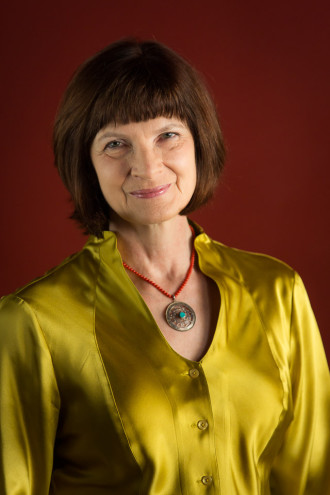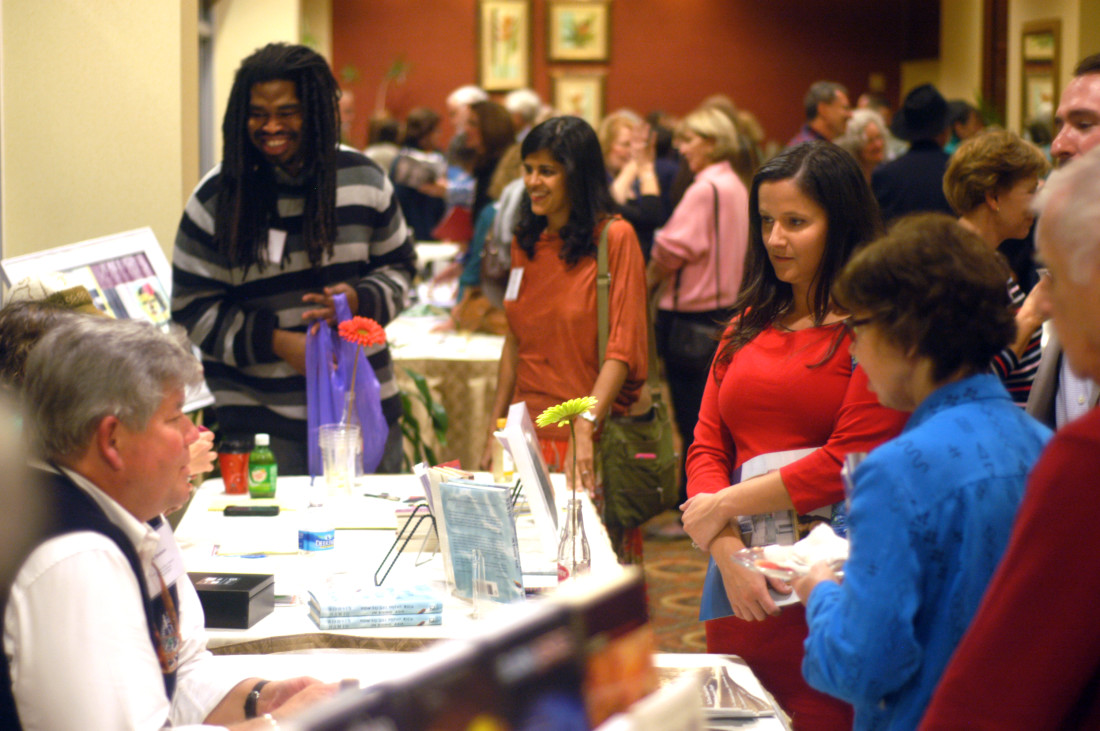“Welcome to the Writingest State” is the greeting on the home page for the North Carolina Writers’ Network, a 1,400-member organization. Formed in 1985, it’s now one of the largest writers’ institutions in the country. And while the designation of “the writingest state” isn’t about to replace “First in Flight” on North Carolina license plates (it was actually a declaration made by Statesville-born author Doris Betts), it offers some explanation of both the success of the network and its biannual conference.
“We try to honor the local literary community of whatever locale we happen to be in that year,” says Executive Director Ed Southern, who’s helmed both the network and its conferences since 2008. While the one-day spring event offers tools, discussion and insight into craft and marketing, the three-day fall conference is the network’s main event. While the gathering rotates locations throughout the state, this year it returns to Asheville, taking place at the Doubletree by Hilton Asheville-Biltmore Friday to Sunday, Nov. 20-22.
Learning from locals
Although some states might be hard-pressed to fill a writers’ conference with local literary experts, Southern has the opposite problem. “Usually we have more writers that we’d like to involve than we do workshop slots on the schedule and rooms in the hotel,” he says. “Inevitably, there are at least a few writers who we’d love the invite but we simply can’t.” This year’s faculty, selected in part through recommendations by the network’s board members, includes YA author Megan Shepherd, middle grade author Robert Beatty and Laura Hope-Gill, the director of Lenoir-Rhyne University’s Thomas Wolfe Center for Narrative writing program, among other locals.
“We’re open to writers who are interested in leading a workshop getting in touch with us and sending a workshop proposal,” says Southern. “We want to invite and engage writers who may be new to the network, but we also like to invite back old friends and teachers who are popular and we know will do a good job.”
The workshop roster includes five sessions held over Saturday and Sunday, with topics ranging from prose poetry and perfect first paragraphs to online tools and how to submit a manuscript. Each hour-and-a-half session is meant to be accessible to newer writers. For those with more experience and a desire to delve deeper, Saturday also includes master classes in poetry, fiction and creative nonfiction. (Those pre-registration-required workshops were full at press time.) Asheville-based author and educator Christine Hale leads the “Using the Imagination in Memoir” class.

You must remember this
“My thinking on that has evolved quite a bit, first from creating my own memoir,” says Hale. A fiction writer, her own foray into nonfiction came as a surprise. Her book A Piece of Sky, A Grain of Rice: A Memoir in Four Meditations touches on tattoos she and her adult children got as a linking ritual, memories of her childhood growing up in Appalachia, plus ruminations on a series of Buddhist retreats. It will be published in the spring.
Hale has been teaching the class “Remembering, Misremembering, Disremembering” as part of the Great Smokies Writing Program. It delves into the question of how to approach memoir writing when the memory is so fallible. “A lot of people who haven’t written before want to write a memoir because they have a story to tell,” says Hale. “Some of them become very frightened that they won’t remember it ‘right.’” But there is no exactitude about experience, she says. It depends on who you are now, who you were then and how you interpret it.
A Warren Wilson MFA alumna, Hale is also an instructor at Antioch University Los Angeles’ low-residency MFA program. “What I’d like to impart to people in the master class is, wherever you are in the process of writing a memoir, the fallibility of memory is your friend,” she says. “You’ve got to recognize that and turn it to literary advantage and personal advantage in terms of exploring the self.”
Something for everyone
Beyond the fine-tuned work of a master class, the conference runs the gamut of industry tips, networking opportunities and writerly fun. The schedule includes a keynote address by renowned author Lee Smith, open-mic readings, and — in celebration of the network’s 30th anniversary — a performance by local poet and musician Keith Flynn and his band, The Holy Men. Flynn is the creator and managing editor of Asheville Poetry Review and led the poetry-meets-rock band The Crystal Zoo in the 1980s and ’90s.
“I think it’s more friendly — or even egalitarian — than a lot of conferences,” says Southern. “We strive to be, and I think we are, more welcoming to new and novice writers.” There are other differences, too — many similar conventions focus on opportunities for writers to pitch their work to literary agents, editors and publishers. Workshops and networking are the focal point of the N.C. Writers’ Network conference, though a manuscript mart and critique service are available.
“The manuscript mart is a great opportunity to get real-life advice from a publishing professional,” says Southern. To participate, interested writers send in 20 pages of a project in advance of the conference. At the event, they sit down one on one for 30 minutes with a professional editor or agent and discuss what works, what doesn’t and what can make the manuscript more publishable.
“Even in this day and age when we hear all the dire warning about the decline of the publishing industry, we’re lucky to have hundreds if not thousands of good presses of all sizes and all niches who are looking for good manuscripts to publish each and every day,” says Southern. “The purpose of our fall conference is to help writers produce those good manuscripts and get them into the hands of the right publisher or the right agent.”
Write on
So why attend a writers’ conference in the first place? “Conferences are great because they’re accessible to more people in terms of time and money,” says Hale. She was recently part of the Carolina Mountains Literary Festival and attended Writers in Paradise in St. Petersburg, Fla., when she lived in that state. “They’re a great place to make connections, to meet other writers. Everybody needs writing friends to read your work in progress.”
Making inroads with senior writers or publishers can be helpful, Hale points out, but “it’s almost like a business conference. You try to pick up two or three things that you can carry away with you.”
In the case of the Asheville event, it’s also an opportunity to hear from important regional authors whose body of work — still unfolding — is adding to Betts’ definition of The Writingest State. Lee Smith, who delivers the keynote address Friday, has won the O. Henry Award, the American Academy of Arts and Letters Award for Literature, the North Carolina Award for Literature and Mercer University’s Sidney Lanier Prize for Southern Literature (of which she was the first recipient). Kathryn Stripling Byer, featured at the Saturday luncheon, served as North Carolina’s fifth poet laureate. And, at a Sunday breakfast panel discussion, those interested in publication can hear from Stephen Kirk, an editor at John F. Blair, Publisher in Winston-Salem; Betsy Teter, founder and executive director of the Hub City Writers Project in Spartanburg, S.C., and literary agents Neeti Madan (of New York-based Sterling Lord Literistic) and Gary Heidt (of Washington, D.C.-based Signature Literary Agency).
For a new writer or a first-time conference attendee, the wealth of information can sometimes be overwhelming, but Hale offers a perspective on making sense of that treasure trove of resources. “If we go with an open heart and mind, we get what we need,” she says. “Trust that to put yourself in the company of other writers, you’ll hear something that you need to hear.”
WHAT: North Carolina Writers’ Network Fall Conference, ncwriters.org
WHERE: Doubletree by Hilton Asheville-Biltmore, 115 Hendersonville Road
WHEN: Friday to Sunday, Nov. 20-22. On-site registration (does not include meals) is $450 full conference/$350 Saturday only/$250 Sunday only.



Before you comment
The comments section is here to provide a platform for civil dialogue on the issues we face together as a local community. Xpress is committed to offering this platform for all voices, but when the tone of the discussion gets nasty or strays off topic, we believe many people choose not to participate. Xpress editors are determined to moderate comments to ensure a constructive interchange is maintained. All comments judged not to be in keeping with the spirit of civil discourse will be removed and repeat violators will be banned. See here for our terms of service. Thank you for being part of this effort to promote respectful discussion.